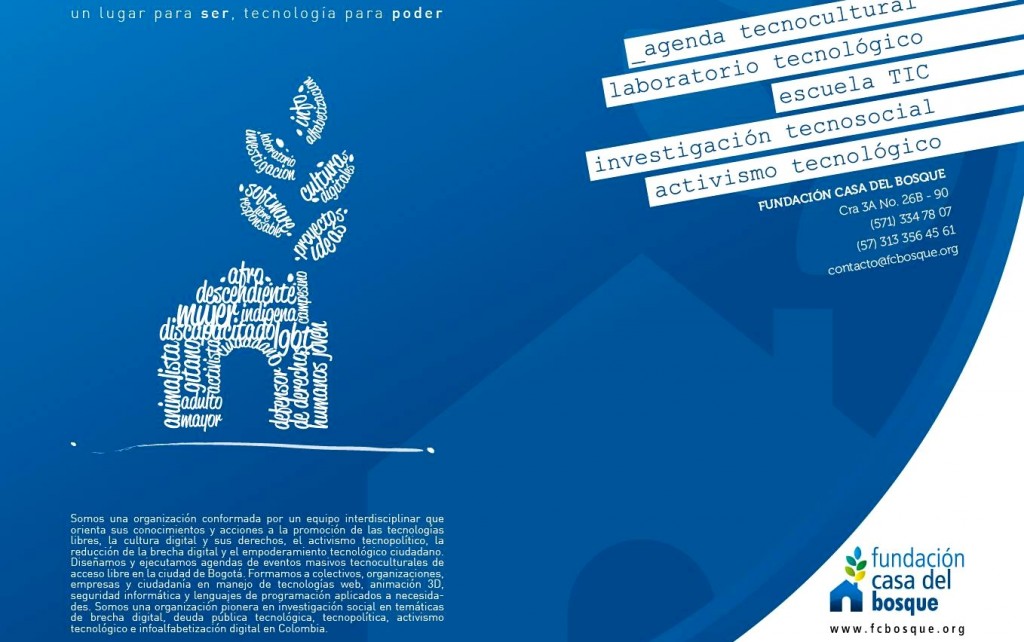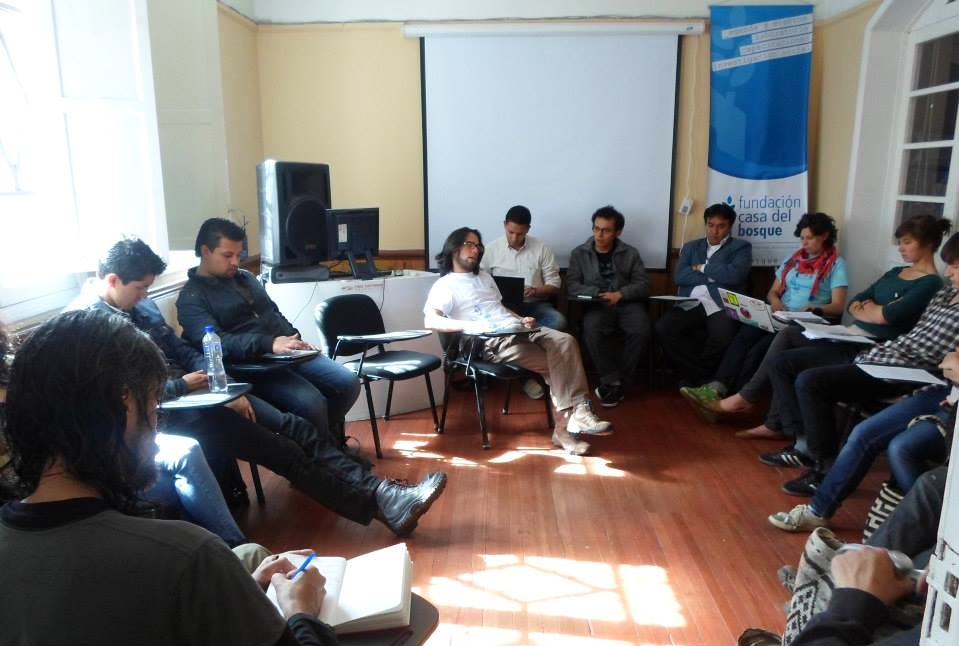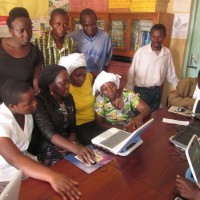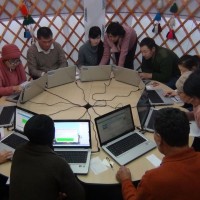
Bogotá, like other Latin American cities, has spaces for technological activists and those who want to learn about technology to meet and generate new synergies and activities where they develop practical applications for these issues. Fundación Casa del Bosque [es] is one of these spaces.
The Foundation, formed by an interdisciplinary team, provides management training in web technologies, 3D animation, computer security and programming languages, and also carries out research about the social digital divide, public technological debt, technopolitics, activism and technology in digital literacy in Colombia. In their own words [es]:
Nos concebimos como una organización autosostenible, que destina los recursos de su áreas de servicios a la gestación de redes de empoderamiento tecnológico en territorios de la ciudad de Bogotá, promoción al software libre y la cultura libre e impulso a procesos infoalfabetizadores en ciudades de Colombia.
We see ourselves as a self-sustaining organization that allocates resources in our service areas for preparing technological empowerment networks in zones of the city of Bogotá, promoting free software and free culture, and boosting the processes of digital literacy in the cities of Colombia.
There are various activities organized by the Foundation, such as the Copycultura,[es] Con3ctiva [es] and Bogotic [es] projects among others. These actions will be framed within the areas of work that the Foundation considers important for its development:
Focus: Citizen participation in technopolitics: bogoTIC: Citizen Oversight Network for Addressing Critics of ICT in Bogotá.
Focus: Technocultural promotion: Copycultura: launch pad for artists who are promoting free culture in Bogotá.
Focus: Technological output: bogoLAB: Technological Intervention Laboratory to Reduce the Digital Divide in Bogotá.
Focus: Citizen Technological Empowerment: Latin American Meeting of Web Technologies.
Focus: Intervention and reduction of the digital divide and access to digital culture – Festival of Techno-Towns.
Focus: Promoting digital content and open licenses: Film Festival Creative Commons Bogotá. Con3ctiva portable digital platform for access to Creative Common audiovisual content.
Focus: Flow of information and strengthening citizen technoculture: International Technocultural Residencies.
María Juliana Soto wrote [es] about FCBosque in Open Business in 2011, giving a short history of the Foundation and then describing their implementation of the IAP model (Research-Action-Participation): “It is a participatory approach that promotes understanding the reality of the population (socioeconomic characteristics, resources, needs, etc.) and allows the planning and execution of more precise actions.”
One of the main ideas that FCBosque handles is technopolitics —but, what is technopolitics? According to 15-M Movement’s wiki it is the “tactical and strategic use of digital tools or organization, communication, and collective action. The capacity of connected crowds, brains and bodies networked to create and auto-adjust collective action.”
Farid Amed, from Fundación Casa del Bosque, makes some observations [es] about the concept of technopolitics from an historical and Latin American perspective:
Somos la cuarta generación comunicacional que hoy tiene la posibilidad de juntar las luchas previas comunicacionales de los últimos 400 años. La imprenta, la radio, la TV, internet, cuatro escenarios de poder comunicacional que sin duda, articuladas en favor de la humanidad podrían imprimir dinamismo a los cambios urgentes del planeta. Somos una generación en donde el activismo tecnológico no es una postura circunstancial, somos una generación llamada a conceptualizar en tecnopolítica las luchas comunicacionales de nuestros tiempos…
La tecnopolítica como red de conocimiento llamada a fundar consciencia ciudadana para la construcción de políticas públicas propicias para la autonomía tecnológica de nuestros pueblos. La tecnopolítica del empoderamiento responde con políticas públicas y de resistencia en Brasil, Ecuador, Bolivia, Argentina, Uruguay, Venezuela… Las luchas perdidas en el pasado, pueden volver a ser las nuevas luchas del futuro. Internet libre, tecnopolítica para una tecnología pública y de acceso urgente para una sociedad democrática como postulado de acción coordinada y planetaria.
We are the fourth communicational generation which nowadays has the possibility of bringing together the communication struggles from the past 400 years. The press, radio, TV, Internet, four scenarios of communicational power that undoubtedly, articulated in favor of humanity, could provide impetus to pressing changes in the world. We are a generation where technological activism is not a circumstantial position, we are a generation called to conceptualize the communication technopolitical struggles of our times…
Technopolitics as a network of knowledge called to create civic consciousness to build public policies conducive to the technological autonomy of our peoples. The technopolitics of empowerment meshes with public policy and resistance in Brazil, Ecuador, Bolivia, Argentina, Uruguay, Venezuela… The fights lost in the past can be the new struggles of the future. Free Internet, technopolitics for public technology, and emergency access to a democratic society as postulated in a coordinated and global action.
In another article, Farid talks about the relationship [es] between software and free culture, and technopolitics, and talks as well about the theoretical gaps in the discussion about hacktivism and technopolitics.
El software y hardware libre aseguran empoderamiento ciudadano, transparencia, reducción de monopolios y con ello mantenimiento de la democracia. La cultura libre garantiza accesos al saber, y con ello, el mantenimiento de derechos. La tecnopolítica análiza política, sociológica y geopolíticamente las relaciones sociales y corporativas de base tecnológica, alertando y accionando sobre aquellas dinámicas que limiten el poder ciudadano en el ámbito de las telecomunicaciones.
Free software and hardware ensure citizen empowerment, transparency, and reduction of monopolies, thereby maintaining democracy. Free culture ensures access to knowledge, thereby maintaining rights. Technopolitics analyzes social and corporate relationships politically, sociologically and geopolitically, through technology, alerting and taking action about those dynamics that limit citizen power in the field of telecommunications.
It was indeed Farid Amed with whom I had a chance to talk a couple of weeks ago in Bogotá, and what is included in this video was part of that conversation.
FCBosque permanently accepts Technocultural Residencies, as a way to facilitate the implementation of action plans, research, development and intervention related to the use of technology and reducing the digital divide, connectivity, info-literacy or empowerment, targeted mainly but not necessarily, at underrepresented or marginalized communities in Colombian society.
In the following video we get to physically know the Casa del Bosque as well as some of the activities taking place there:
You can follow the Casa del Bosque Foundation on Facebook, G+ and Twitter, as well as Idéntica. Don't miss their videos on YouTube, or their library downloadable from their website, on topics like Free Software, Technology Transfer, Digital Divide, and others [all references are in Spanish].
Similar posts:
Diferencial CAC: A Hacklab in Quito, Ecuador
Spaces: The Escuelab





2 comments